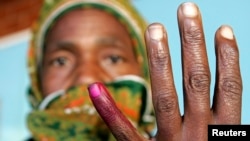The Zimbabwe Election Support Network (ZESN) says COVID-19 has crippled democratic processes in the southern African nation where by-elections to fill vacant parliamentary and council seats have been suspended indefinitely.
In a statement to mark International Day of Democracy, ZESN said, “This day comes amid the battle with the COVID-19 pandemic which has led to fatalities, surge in infections and the closure of so many multi-sectoral spaces. Democracy has also suffered a huge blow especially in Zimbabwe; with the indefinite suspension of by-elections and other electoral activities. This has led to the quarantining of democracy and prevention of equal participation of citizens in democratic electoral and governance processes.
“Civic society and institutions supporting democracy constantly appeal for multi-stakeholder efforts towards the promotion of inclusion, equal treatment, and participation in democratic governance issues by citizens to ensure sustainable peace and development. International Day of Democracy presents ZESN with the opportunity to reiterate its calls for the government to uphold the principle of holding periodic elections by universal suffrage and to put in place measures that ensure inclusive participation in elections, especially of women, People with Disabilities (PWDs), and youths in Zimbabwe.”
ZESN said despite the fact that women constitute the demographic majority, and youths account for the largest voting population, their participation, especially as candidates, in elections has been very low. This, according to ZESN, has resulted in the limited representation and participation of these important constituencies in the governance of the country.
“ZESN remains committed to promoting democratic elections in Zimbabwe that are free and fair elections in line with international best practices and respect for human rights. Voter registration is a continuous process in Zimbabwe, hence the Network implores all citizens that are 18 years of age and above to register to vote to ensure they all participate in the democratic electoral processes.”
The opposition Movement for Democratic Change led by Douglas Mwonzora has recalled a large number of parliamentarians and councilors said to be linked to Nelson Chamisa’s MDC Alliance. The process of recalling more lawmakers and councilors in currently being conducted nationwide.
The United Nations defines democracy as a state where the people have rights, especially to vote for and elect their government and regulation from among themselves, rather than being controlled by a government over whom they have no right of dissent, election or protest. “Lack of democracy can lead to lack of rights or a voice, and this impacts on human rights as set out by the UN.”
International Day of Democracy was commemorated yesterday under the theme “Strengthening democratic resilience in the face of future crises.”
In a statement, the United Nations said the unprecedented COVID-19 crisis has resulted in major social, political and legal challenges globally. The UN noted that as states around the world adopt emergency measures to address the crisis, it is critical that they continue to uphold the rule of law, protect and respect international standards and basic principles of legality, and the right to access justice, remedies and due process.
UN Secretary General António Guterres was quoted in the UN website as saying governments should be transparent, responsive and accountable in their COVID-19 response and ensure that any emergency measures are legal, proportionate, necessary and non-discriminatory. “The best response is one that responds proportionately to immediate threats while protecting human rights and the rule of law.”
The Secretary General’s policy brief says states must respect and protect, among other rights, freedom of expression and of the press, freedom of information, freedom of association and of assembly.
The United Nations says the International Day of Democracy provides an opportunity to review the state of democracy in the world. It says democracy is as much a process as a goal, and only with the full participation of and support by the international community, national governing bodies, civil society and individuals, can the ideal of democracy be made into a reality to be enjoyed by everyone, everywhere.
“The values of freedom, respect for human rights and the principle of holding periodic and genuine elections by universal suffrage are essential elements of democracy. In turn, democracy provides the natural environment for the protection and effective realization of human rights. These values are embodied in the Universal Declaration of Human Rights and further developed in the International Covenant on Civil and Political Rights, which enshrines a host of political rights and civil liberties underpinning meaningful democracies.
The link between democracy and human rights is captured in article 21(3) of the Universal Declaration of Human Rights, which states: “The will of the people shall be the basis of the authority of government; this will shall be expressed in periodic and genuine elections which shall be by universal and equal suffrage and shall be held by secret vote or by equivalent free voting procedures.”




